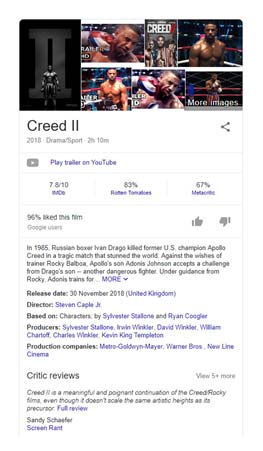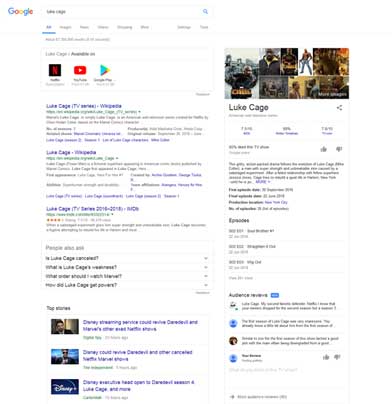There is a big debate taking place in the SEO World at the moment, strongly advocated by one individual in particular by the name of Rand Fishkin who believes Google are betraying website owners and content creators alike within their search results. His reasoning behind this is that Google are scraping these website owners and curators’ content and pulling it into the Search Results, providing users with the info they are looking for without ever visiting the original website who provided this information.

Rand’s recent talk at BrightonSEO centred around the shift in Google’s focus over the past few years from a search engine that sends users to websites in answer to their search queries and instead, moving towards self-hosted answers and solutions without the user ever having to navigate away from Google.
A great example of this is searching for a film name, especially whilst on mobile. There is so much information provided to a searcher without them ever having to navigate away from Google. But the question is, is this a good or bad thing? In Rand’s opinion ‘That’s made SEO much more difficult, as Google, for the first time in its history, is sending less outbound traffic.’

The consensus seems to be that this solves an issue for the user by serving immediate answers to their query without necessarily having to search around for the best answer, as Google serves what it believes is the best result in response to any given search query. But on the other side of the coin, this also creates an issue for website owners and content creators who aren’t getting their content featured. We anticipated some of these concerns as an Agency when Google Knowledge Graph was first introduced in 2012.
The root of their frustrations stem from the fact that traditionally Google gets to crawl these websites for free, use their hosting bandwidth for free, scrape content without trademark consequence and rely upon website owners and marketers to optimise to their standards, and in return, websites who solve searchers problems earn clicks with their content. However, a growing proportion of marketers and online business owners believe that Google are now changing the deal.
The Knowledge Panel being removed should give website owners a better chance of winning the clicks and traffic through to their websites
Back in 2005, Google had 3 or 4 serious competitors in the form of Yahoo!, MSN, AOL and arguably Ask Jeeves, so they weren’t really in any position to aggrieve content creators. However, in 2018 Google now holds a 90% market share and is in a much more powerful position then 13 years ago, meaning they can make these changes to the search results with little to no repercussions. This can be demonstrated by the 20% drop in mobile organic click-through rate between Feb 2016 – Feb 2018, and even more shockingly a 20% increase in mobile ‘no click’ searches, from 41% to 61% in the same period. The bulk of these changes can be seen on mobile devices across more popular search queries, as opposed to long tail searches and it’s a relatively equal split across informational and transactional search queries. As you can see from the screenshot below, Google display a number of transactional options without the user navigating away from the search results, and even state that they may be compensated by some of these providers – more fuel to the fire for website owners whose toes this may be treading on.

Google’s Removing The Knowledge Panel Though?
Google have recently announced in the Google Web Search Help forums that they are currently testing removing the knowledge panel that we usually see on the top right-hand side of the search results. Andy B. from Google wrote “want to confirm that what you are seeing is an experiment. We’re always testing new ways to improve the Search experience for users, and one of the ways we achieve this is by experimenting with different methods.” He added that if you don’t like it “please leave in-product feedback at the bottom of your Search results page to share your thoughts.” But is this a direct response to the ongoing debate within the SEO World? Or is it more to do with the fact that the knowledge panel can often be inaccurate and is difficult for Google to stay on top of?
The Knowledge Panel being removed should give website owners a better chance of winning the clicks and traffic through to their websites. Particularly sites which may rank #2-7 but not have been featured in Google’s Knowledge Panel information previously. This can only be good for SEO marketing campaigns. However, will it frustrate users who have become accustomed to gaining the answer they need without having to make that extra click? Does that matter?
Whatever side of the table you’re currently sitting on regarding this debate, it’s is sure to continue long into the future as Google continue moving towards self-hosted answers and solutions. But what will be most interesting to monitor in the more imminent future is the impact that not displaying a knowledge box in the search results could have on click-through rate and ‘no click’ searches, especially when looking at mobile devices. Given the trends we have seen in the past few years, our initial thoughts would suggest that we will see CTR increase once more, however this is also totally dependent on what will replace the large white void that is left if the knowledge panel is permanently removed… Google Ads I hear you say? Only time will tell.
Follow my contributions to the blog or sign up to the ThoughtShift Guest List, our monthly email, to keep up-to-date on all our blogposts, guides and events.






